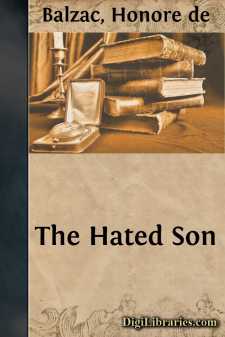Categories
- Antiques & Collectibles 13
- Architecture 36
- Art 48
- Bibles 22
- Biography & Autobiography 813
- Body, Mind & Spirit 142
- Business & Economics 28
- Children's Books 15
- Children's Fiction 12
- Computers 4
- Cooking 94
- Crafts & Hobbies 4
- Drama 346
- Education 46
- Family & Relationships 57
- Fiction 11828
- Games 19
- Gardening 17
- Health & Fitness 34
- History 1377
- House & Home 1
- Humor 147
- Juvenile Fiction 1873
- Juvenile Nonfiction 202
- Language Arts & Disciplines 88
- Law 16
- Literary Collections 686
- Literary Criticism 179
- Mathematics 13
- Medical 41
- Music 40
- Nature 179
- Non-Classifiable 1768
- Performing Arts 7
- Periodicals 1453
- Philosophy 64
- Photography 2
- Poetry 896
- Political Science 203
- Psychology 42
- Reference 154
- Religion 513
- Science 126
- Self-Help 84
- Social Science 81
- Sports & Recreation 34
- Study Aids 3
- Technology & Engineering 59
- Transportation 23
- Travel 463
- True Crime 29
Gambara
by: Honore de Balzac
Categories:
Description:
Excerpt
GAMBARA
New Year's Day of 1831 was pouring out its packets of sugared almonds, four o'clock was striking, there was a mob in the Palais-Royal, and the eating-houses were beginning to fill. At this moment a coupe drew up at the perron and a young man stepped out; a man of haughty appearance, and no doubt a foreigner; otherwise he would not have displayed the aristocratic chasseur who attended him in a plumed hat, nor the coat of arms which the heroes of July still attacked.
This gentleman went into the Palais-Royal, and followed the crowd round the galleries, unamazed at the slowness to which the throng of loungers reduced his pace; he seemed accustomed to the stately step which is ironically nicknamed the ambassador's strut; still, his dignity had a touch of the theatrical. Though his features were handsome and imposing, his hat, from beneath which thick black curls stood out, was perhaps tilted a little too much over the right ear, and belied his gravity by a too rakish effect. His eyes, inattentive and half closed, looked down disdainfully on the crowd.
"There goes a remarkably good-looking young man," said a girl in a low voice, as she made way for him to pass.
"And who is only too well aware of it!" replied her companion aloud—who was very plain.
After walking all round the arcades, the young man looked by turns at the sky and at his watch, and with a shrug of impatience went into a tobacconist's shop, lighted a cigar, and placed himself in front of a looking-glass to glance at his costume, which was rather more ornate than the rules of French taste allow. He pulled down his collar and his black velvet waistcoat, over which hung many festoons of the thick gold chain that is made at Venice; then, having arranged the folds of his cloak by a single jerk of his left shoulder, draping it gracefully so as to show the velvet lining, he started again on parade, indifferent to the glances of the vulgar.
As soon as the shops were lighted up and the dusk seemed to him black enough, he went out into the square in front of the Palais-Royal, but as a man anxious not to be recognized; for he kept close under the houses as far as the fountain, screened by the hackney-cab stand, till he reached the Rue Froid-Manteau, a dirty, poky, disreputable street—a sort of sewer tolerated by the police close to the purified purlieus of the Palais-Royal, as an Italian major-domo allows a careless servant to leave the sweepings of the rooms in a corner of the staircase.
The young man hesitated. He might have been a bedizened citizen's wife craning her neck over a gutter swollen by the rain. But the hour was not unpropitious for the indulgence of some discreditable whim. Earlier, he might have been detected; later, he might find himself cut out. Tempted by a glance which is encouraging without being inviting, to have followed a young and pretty woman for an hour, or perhaps for a day, thinking of her as a divinity and excusing her light conduct by a thousand reasons to her advantage; to have allowed oneself to believe in a sudden and irresistible affinity; to have pictured, under the promptings of transient excitement, a love-adventure in an age when romances are written precisely because they never happen; to have dreamed of balconies, guitars, stratagems, and bolts, enwrapped in Almaviva's cloak; and, after inditing a poem in fancy, to stop at the door of a house of ill-fame, and, crowning all, to discern in Rosina's bashfulness a reticence imposed by the police—is not all this, I say, an experience familiar to many a man who would not own it...?






















